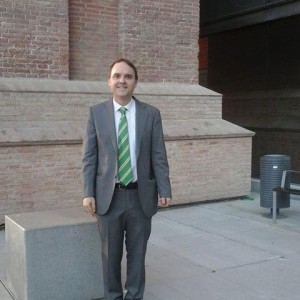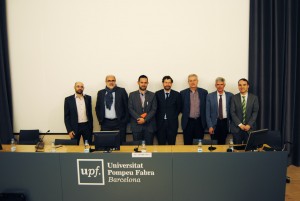A successful XXI Cable and Broadband Catalonia Congress
The high progress in installing optical fiber and the assumption by businesses and individuals, the need for such a wealth of broadband are the highlights of the XXI Cable and Broadband Catalonia Congress, which they took place from 3 to 5 May in the 22 @ Barcelona (Poblenou Campus Auditorium of the Universitat Pompeu Fabra) with great success of participation and content.
 “Broadband advances in Catalonia and Spain is above the rest of Europe. It provides long term for all of society benefits,” summarizes Joan Francesc Fondevila, director of the Cable Studies Center (CECABLE), organizer of the event, with the Department of Communication and the Observatory of Scientific Communication at the University Pompeu Fabra (UPF) and Acotec (Catalan Association of Cable Telecommunications Operators).
“Broadband advances in Catalonia and Spain is above the rest of Europe. It provides long term for all of society benefits,” summarizes Joan Francesc Fondevila, director of the Cable Studies Center (CECABLE), organizer of the event, with the Department of Communication and the Observatory of Scientific Communication at the University Pompeu Fabra (UPF) and Acotec (Catalan Association of Cable Telecommunications Operators).
The various companies and organizations analyzed the strategic factors of telecommunications, such as technological developments, consumer behaviour, the need for constant and guaranteed connectivity or competition within the international framework. In “Broadband in Catalonia and Spain”, Joan Oliver (Wifidom) stressed the role of wireless as universalizing access to broadband, especially in rural areas. Esther Fernandez (Hispasat) prevents flooding in terrestrial networks.
In line with virtualization (David Noguer, Juniper Networks) and trends in the telecommunicative market (Juan Morlanes, Accenture, for whom the customer prioritizes “tangible experience”), it became clear quality and satisfactory pace of implementation of the deployment of FTTH in Catalonia and Spain. Esteve Bosch (Telefónica) stressed the high bandwidth available, assessable in terms of Gbps. The GPON structure provides “added value” according to Octavio Benedí (Telnet). Josuè Sallent (Barkeno) stressed the need for broadband in areas like industrial estates in Sant Vicenç dels Horts, Palamos or Santa Perpètua de Mogoda: “People take for granted and wants connectivity services,” he said.
The model of Xarxa Oberta de Catalunya (XOC), with five years of experience as neutral operator in Catalonia, sums up the idea of optimizing networks already deployed in the opinion of Joan Cervera. The operator plans focus on deploying network Solsonès and Bages, Vall d’Aran, Cerdanya and Ripollès, Osona Norte, La Selva and Priorat, with the aim of “improving the local economy”.

In block “Services and content on broadband networks”, the round table “The technological evolution of historical Catalan and Spanish cable”, reflected the health of the plethora of small operators. “The media companies and telecommunications proximity are adapting to technological developments, and most are betting on FTTH GPON”, explained Fondevila (CECABLE and universities). Xavier Edo (Alpha Enginyeria of Telecomunicacions and Acotec), the main added value of traditional cable is the rapid response to the end user. From Air Networks (Pablo Gil) has stressed the need for all services unified, and “the weight of the Catalan relevant market” he said. Representatives of various operators (Enric Grosche, of XEIC, and Ramon Uixé, La Cala de Fibra) expressed satisfaction with the conservation of customers despite growing competition. Manel Berencia (Bitnap) highlighted the key factor posed by data centers for operators.
Francisco Lover (Anvimur) stressed the impact of IPTV and traditional cable television and exposed the performance of middleware “most used in Spain by operators of fiber optic, Internet and wi-fi”.
In “Evolution of installation type and cable broadband,” the weight of the phenomenon cloud of clouds for businesses in terms of Narcís Coll (BT Global Services) was observed. The sector is very dynamic, as reflected in measures in the new access networks, according to Robert Pous (Promax) and Technetix (Diego Royo and Raquel Millo). Since Elecnor (Joaquín García) everyday situations were explained in the deployment of wired telecommunications networks, more complex than it may seem.
Innovation governs structured cabling systems, according to Manuel Pujol (Datwyler Cabling Solutions), and smart grids, according to Jorge Lago and José Luis Soria (Cablerunner Iberian). Operators require solutions for monitoring and supervision 7×24 fiber optic networks, showed Raül Galbany (Optral) and Jordi Lozano (W-onesys). Joaquín Vázquez (Duraline) explained the advantages of installing microducts. Francisco Lopez (Fibercom) detailed an innovative formula for deployment of PON FTTH infrastructure in rural environments “allows long-term savings.”
In “New horizons for the IT sector”, Watchguard (Diego Solis) and Panda Security (Susana Garcia) reflected the need to prevent in terms of enterprise security. Sharing Academy (Jordi Llonch) discussed strategies to create an app.
Round table “How the expansion of broadband networks translates into social progress?”, in “various impacts of broadband networks”, he showed that “a well-endowed society telecomunicativa infrastructure is a society that progresses more than the rest rhythm “in terms of Fondevila (CECABLE and universities), adding that” investment in research on social programs must involve monitoring results”. Ricard Faura (Generalitat de Catalunya) highlighted “the need to avoid gaps” given that the network expansion should follow the needs, “and not vice versa”. Román Lantarón (FECEMINTE), the role of installer is crucial to bring broadband to all environments, including 115 million Europeans who suffer some disability. Ramon Vives (Bitnap) had an impact on the employability factor groups with difficult access to jobs. Alfred Causi (Telecos.cat) emphasized that “we must be aware of the social impact of infrastructure to deploy and maintain.” Daniel Ollé (CNMC) stressed the interest of the regulator by the expansion of the network in a “multi-operator” environment, while Joan Cervera (XOC) praised the spirit of solidarity of the network “on social key”.
In the package of services telecomunicativos highlights the role of the audiovisual. Eudald Domènech (Agile OTT) discussed the need for a platform co-branded TV for the sector to complete a competitive quadruple play in full convergence requirement TV + Internet, synthesized in the HbbTV, according Andrés Román (Sony). Cable operators need quality television content, according to Roman Cortizo (Televisa). Similarly, beyond the home user, telecom operators should support the business community, according to David Andreu (Anxanet). The optical fiber is reinforcing the quintuple play, what drives the new convergence in enterprise communications: fixed-mobile-apps, according to Xavier Casajoana (VozTelecom), who said “the important is the individual, beyond the terminal used for be located “.
The main social networks (Twitter, Facebook, LinkedIn, Google+, Instagram, Pinterest), with high activity (more than 55,000 positive reactions; an amazing success), allowed to follow the event, which featured numerous stands (Anvimur, micro-trenching, Telnet, VozTelecom, ARTSYS, Optral, Air Networks, Televisa, Fibercom, Duraline and Bitnap), very busy and great networking. The enterprises in the event indicated it was a big success.
In the event participated and helped the Catalan government, Cercle Fiber, Marketing Club of Barcelona, College of Graduate Engineers and Industrial Engineers of Barcelona (CETIB), Catalan Association of Telecommunications Engineers (Telecos.cat), Association of Technical Engineers Telecommunications of Catalonia (COETTC), College of Technical Engineering and Degree in Computer Engineering of Catalonia (COETIC), National Commission Markets and Competition (CNMC), Catalan Business Federation of Telecommunications Installers (FECEMINTE) Coordinating Federation Telecommunications (FECOTEL), Federation of Telecommunications Installers (Fenitel), Barcelona Digital Technology Centre, TIC.CAT, Red.es, Localret, National Association of Telecommunications Operators and Internet Service Provider (AOTEC), Spanish Association of Digital Documentation (AEDOC) National Association of Internet (ISNA), Association for the Advancement of Management (APD), Multisectoral Association of Spanish Companies of Electronics and Communications (Asimelec), Catalan Technology Association (ACTec), Association of Technical Computing (ATI ), Association of Operator Companies and Telecommunication Services (Astel), CTecno, Vallès Technology Park (PTV), National Reference Center for the Application of Information Technology and Communication ICT (CENATIC), Ilimit, International Association of Technology, Education and Development (IATED), Foundation for Enterprise Development info- and Society (Fundetec), Platform FOTÓNICA21 or Catalan Society of Technology. Likewise the event, inter-university, had the support of the Mediterrani School of the University of Girona, the Faculty of Communication and International Relations at the University Ramon Llull, University of Barcelona, the Autonomous University of Barcelona, the Open University of Catalunya and the University Camilo Jose Cela.






